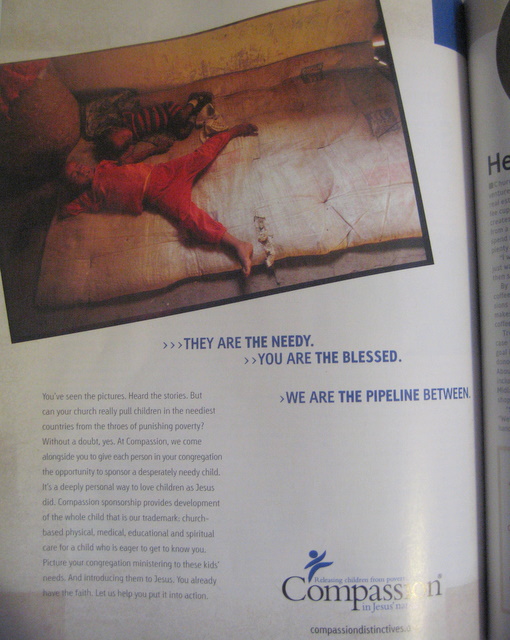I got a copy of Leadership Magazine in the mail yesterday. I forget why, but it showed up and so I started a quick skim through it. This ad caught my eye. Before I start, let me just say that I am a big fan of Compassion and the work they do. I’m also not bothered by using advertising and appealing to Christians in the USA to give. What I do have a problem with is the wording and what I see to be a direct contradiction to what Jesus says.
The ad on the left, with a picture of two young boys sleeping on a mat on the floor, reads:
They Are The Needy.
You Are The Blessed.
We Are The Pipeline Between.
Anyone who knows of Compassion can understand the appeal. Consider sponsoring a child through Compassion, since you have money and they need food, shelter and education.
However, this seems to be counter to what I read Jesus saying:
“Blessed are the Poor.”
Apparently, blessing and need are not mutually exclusive, and one can hypothesize, money might not be a blessing at all. This sort of language bothers me because it continues to create an ‘us’ and ‘them’ mentality and allows us to do acts of ‘charity’ from a sort of pious and self-righteous position. It’s along the same lines of my critique of mixing up the words “unsaved” and “least of these.”
I believe a more accurate advertisement would draw out of us an emotion of the need for justice, and would compell us to give not out of a place of privilege and superiority, but out of our own need to move ourselves from participating in injustice to justice. Jesus words to the “You” in this ad (the people with the money) wasn’t that they were “blessed”, no they were “woe”ed.
“But woe to you who are rich, for you are receiving your comfort in full.”
So, what would be a more accurate advertisement? I’ll give it one shot…
They are Blessed with the Kingdom, but have physical needs
You have money to meet their needs, and wouldn’t it be cool to support the Kings and Queens of God’s Kingdom?
We are the Pipeline to getting you out of Jesus’ “Woe” category…
Do you have any creative ad ideas? I’ll email the best ones to Compassion.
